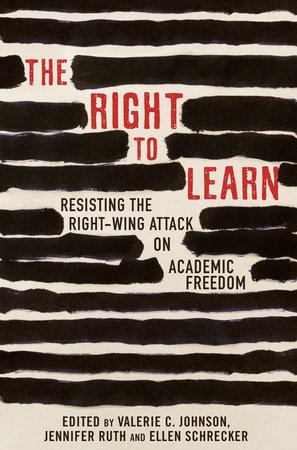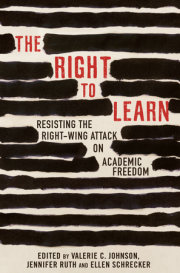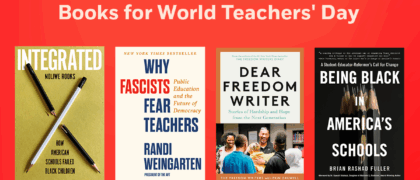Foreword, by Irene Mulvey
INTRODUCTION
A Time for Faculty to Act
Valerie C. Johnson, Jennifer Ruth, and Ellen Schrecker
PART I—THE CURRENT CULTURE WAR
CHAPTER 1
Academic Freedom and Political Repression from McCarthyism to Trump
Ellen Schrecker
CHAPTER 2
A Koch-Funded Racial Backlash: Understanding the Critical Race Theory Moral Panic
Isaac Kamola
CHAPTER 3
The Rise of Educational Gag Orders
Jonathan Friedman, Jeremy C. Young, and James Tager
CHAPTER 4
The Epistemology of Ignorance and Its Impact on Democracy and Higher Education
Valerie C. Johnson
PART II—WHITE RAGE, TWISTED LAWS, AND PATRIARCHAL CONTROL
CHAPTER 5
Knowledge and Good Community Organizing Can Counter the “Divisive Concepts” Campaign
Kevin McGruder
CHAPTER 6
Subverting the Intent of the Fourteenth Amendment
Dennis Parker
CHAPTER 7
“Don’t Say Gay” and Can’t Be Trans: Behind the Anti-LGBTQ+ Schooling Agenda
Sonnet Gabbard, Anne Mitchell, and Heather Montes Ireland
PART III—COLLECTIVE ACTION AND VISIBLE RESISTANCE
CHAPTER 8
The Resolutions: Mobilizing Faculty Senates to Defend Academic Freedom
Jennifer Ruth
CHAPTER 9
Silence Gets Us Nowhere: Faculty Responses to Anti-CRT and Divisive Concepts Legislation
Sarah Sklaw
CHAPTER 10
Academic Freedom: It’s a Question of Job Security
Helena Worthen and Joe Berry
CHAPTER 11
My Battle to Preserve Academic Freedom at the University of Florida
Sharon D. Wright Austin
CHAPTER 12
Florida Faculty Unions and the Struggle for Public Education
Katie Rainwater
CHAPTER 13
Schools of Education Under Fire
Marvin Lynn, Michael E. Dantley, and Lynn M. Gangone
Appendix
List of Contributors
Notes




